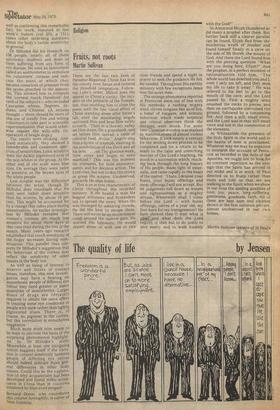Fruits, not roots
Martin Sullivan
These are the last two lines of Paradise Regained. Christ has won His victory over Satan and resisted the threefold temptation. Following Luke's order, Milton puts the appeal to Christ's vanity, the incident on the pinnacle of the Temple, last, thus enabling him to close the poem with the fine visual effect of Christ standing alone after Satan's fall, until the ministering angels surround Him and bear Him safely to earth. -Then in a flowery valley set Him down. On a greenbank, and set before Him spread, a table of celestial food, divine." Angels sing Him a hymn of triumph, exulting in the annihilation of the Devil and all his host" ... on Thy glorious work, Now enter and begin to save mankind." This was the moment for trumpets, for bold announcements and for decisive action. The Lord rises, but not to don His crown or grasp His sceptre. Unobserved, privately He slips home. This is an action characteristic of Christ throughout His recorded ministry. If He healed a man He begged witnesses and bystanders not to spread the news. When He was thronged by admiring crowds, He did His best to escape them. There will never be an inconvenient crush around the narrow gate, He warned His followers. He would depart alone or with one or two close friends and spend a night in prayer to seek the guidance He felt He needed. Throughout His earthly ministry with few exceptions Jesus was the quiet man. The strange phenomena reported at Pentecost seem out of line with His methods; a rushing mighty wind, cloven tongues like as of fire, a babel of tongues, and ecstatic behaviour which made sceptical and critical observers think the disciples were drunk. For some time Chi-istian worship was marked by manifestations of almost violent behaviour. It took nearly a century for the settling down process to be completed and for a return to be made to the calm and unexciting manner of Our Lord's teaching. He stood in a succession which, reaching back through the long history of His people, made light of externalia, and came rapidly to the heart of the matter. "I hate, I despise your feasts, your burnt offerings and meat offerings I will not accept. But let judgement roll down as waters and righteousness as a mighty stream. Wherewith shall I come before the Lord — with burnt offerings, calves of a year old, my first-born for my transgression? He hath shewed thee 0 man what is golccand what doth the Lord require of thee but to do justly to love mercy and to walk humbly
with thy God?"
So Amos and Micah thundered as did many a prophet after them. But further back still a clearer parallel can be found. Elijah fled from the murderous wrath of Jezebel and found himself finally in a cave on the side of Mt Horeb, the mount of God. And there the Lord found him with the piercing question "What are you doing here, Elijah?" And the prophet, in a perfect moment of rationalisation told him, The whole world has deserted you and I, even I only am left, and they seek my life to take it away." He was ordered to his feet to go to the mouth of the cave, and the Lord passed by. First a mighty wind smashed the rocks to pieces, and then an earthquake convulsed the ground, followed by a consuming fire. And then a still, small voice; and the Lord was in that still small voice and not in the commotion of the elements. At Whitsuntide the presence of the Holy Spirit in the world and in the hearts of men is proclaimed. Whatever way we may be expected to interpret the account of Pentecost as recorded in the Acts of the Apostles, we ought not to look for its constant repetition as the only sign that the Spirit has arrived in our midst and is at work. St Paul directed us to fruits rather than roots and told us that we are walking in the Spirit when we show in our lives the abiding qualities of love, joy, peace, long-suffering, gentleness, goodness, faith. All of these are best seen and clearest shown in the first instance, private, almost unobserved in our own homes.
. Martin Sullivan is Dean of St Paul's


























 Previous page
Previous page